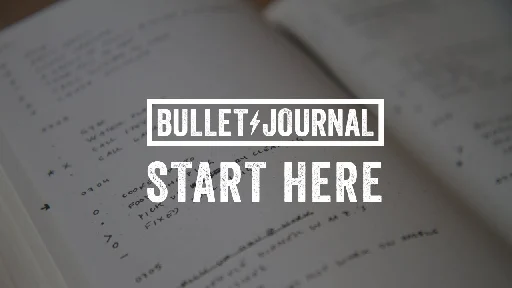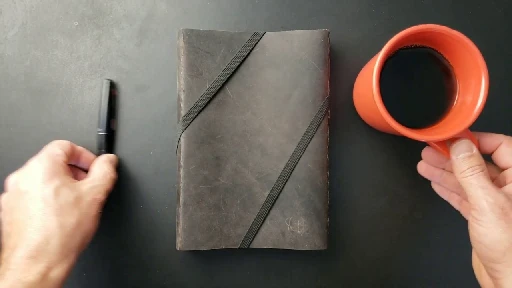
-
How are your summer plans & projects turning out?
Has everything gone according to plan? Maybe something has gone particularly good or bad? Have you given up on something already this year, and are saving it for the next?
-
Mid-Year Planner Review and Reset
It's almost the end of June and that means it's time for your mid-year review/reset. Regular reviews are important in planning, because it helps you keep track of what's still important and how you're getting on in approaching your goals.
There are a few steps to consider.
-
Flip through your past pages looking for tasks that are not yet done. For each task, ask yourself three questions. Is it vital? Does it matter? Are there any negative consequences of not doing it? If the answer to any of these three questions is "yes". migrate the task forward into July. If all three answers are "no", then this task probably isn;t important enough to bother with any more, so bin it.
-
Take a look at your goals. Are you making progress towards them? If not, why not? What needs to change so that you can? Do you have too many goals? You can also apply the same three questions to your goals too, and maybe shelve the ones that don't matter. On the other hand if you've made good progress and have cleared your goals with ease, you can consider some new ones to add in.
-
If you're tracking habits, take a look at those and see where your successes and failures are. If you find you're blasting through with ease, drinking 8 cups of water or doing your 30 minute daily workout without even needing to think about it, you can probably stop tracking those habits. You got them. For ones you're never achieving, consider again whether they really matter, and if they don't, consider dropping them.
-
If you have an end-of-year review from December 2022, take a look at it now and see if there are any insights there into what was important for you at that time, and whether anything has changed 6 months later.
-
If you're working in a bullet journal or customised planner, consider your spreads too. Are the ones you have working for you? Do you want to make any changes for July? Uncompleted spreads are a sign that they're not working for you so try to figure out what you dislike about the spread and why it's not useful, then decide whether to either dump the spread altogether, or re-design it. Also consider if something was missing, and whether you want to add anything new.
-
Finally (and this one applies equally to long-form journalling as well as planning and bullet-journalling) think about the past six months and how it's gone overall for you. What were your great successes so far this year? What have you learned? What memories do you particularly cherish? What didn't go so well and how could you have handled it better? If you're working in a planner or BuJo you can answer these questions in a mid-year review spread. If you're journalling long-form, you can write a page or two to answer them. Either way, don't forget to put the page number into your index, because you'll want to refer to it at your end-of-year review too.
-
-
What frustrated you today?
I think you all know what's frustrating me 😆
And, just a reminder, it's not expected to respond in comments to these prompts; you're supposed to write your answers in your own journal 😊
-
Did you deselect "undetermined" as a language option?
If you did and only have "English" highlighted then any comment that didn't specify its language won't appear.
Lemmy's language implementation is weird right now.
-
Well, this is frustrating
Apparently, people are leaving comments to my posts but I can't see any of them, save for one that I replied to a couple of days ago. To everyone else, I can only apologise, if you are waiting for a reply I am unfortunately not able to give them.
If anyone knows how I may resolve this, please advise by creating a new post (if you reply to this one, I may never see it).
-
Commonplace Book
I had never heard of a commonplace book until I started to follow the journaling community on Youtube. When I discovered it, I realised that it's something I'd already been keeping for years.
A commonplace book is essentially a repository of information that you find, and want to keep or remember. Quotes, maxims, proverbs, shower-thoughts, notes on books you've read, even recipies, reference tables, letters, poems... it's like a scrapbook of words. Or a personal encyclopedia. I've heard it described as the writer's equivalent of an artist's sketchbook, and as I'm both an artist and a writer, I think this analogy is perfect.
It's not just for writers though. It's for anyone. Readers, researchers, students, anyone who has an interest in just about any topic. You're a keen cook? Keep a commonplace book of recipes you find. A gardener? Keep one for information about plants you're growing or interested in growing. Avid consumer of Netflix? Keep track of series you're watching and what you learn from them.
Commonplace books have a long history, going back to Roman philosophers such as Marcus Aurelius (Meditations), and they rose in popularity during the Rennaissance. With the advent of the printing press, many were published.
A commonplace book is a type of journal but it's not a diary (which is the most usual way a journal is structured). It differs from a diary in that its content is not chronological, but rather, categorised by topic. Thus, the most critical part of your commonplace book is the Index. I keep mine in loose-leaf binders which makes searching and categorising even easier.
For those looking for a digital solution, the rise of information management apps such as Notion, Obsidian and Logseq are absolutely perfect for this purpose. Commonplacing is exactly what these apps are created for, even if the creators of them weren't aware of it.
-
How to Bullet Journal

YouTube Video
Click to view this content.
Bullet journaling is a complex topic and I can't explain it any better than the man who invented it, Ryder Carroll. In this video, he shows what it's all about and how to get started.
-
Paper or Digital?
It's often said that paper journaling forces you to slow down and be more mindful, but on the other hand it's less portable; it can't fit in your jeans pocket like your phone can.
Digital options are easier to take with you, and in many cases it's easier to find information that you've put in there, but do they get overlooked amidst all the "noise" we're exposed to every day?
What's your preference, and why? Do you stick exclusively with one or the other? Or do you mix them up? If you combine them, how do you do that? Do you duplicate posts on paper and digitally? Or do you use them for different purposes?
I'm currently on paper only, but some of the digital options intrigue me. I used to use Evernote but I dropped it when many of the features I wanted and used went behind a paywall. lately I've been looking at both Logseq and Obsidian but the learning curve is steep and I'm not ready to launch into them as part of my regular journaling practise yet. I suspect it'll be my Commonplace book that goes in there first.
-
What sort of journaling do you do?
I've been journaling and diary-keeping for many years, but I really got seriously into it in around 1998 or so. I've used both paper and digital journaling (I was on Livejournal for around 10 years, until it jumped the shark) but now I mostly use paper.
I have three journals on the go at the moment. My most important one is a bullet journal, though I have diverged from the "official" format and work mostly in weekly spreads. I find that it helps my ADHD brain keep track of the structure of my week better. For this, I use an A5 dot-grid book. Weirdly, although I'm quite artistic, I keep my journals minimalistic and mostly un-decorated.
I have a daily long-form journal, though in practise I only write long entries a few times a week rather than every day. I'm into the Tarot too, so I also use this one for my daily card pulls and weekly/monthly spreads. For this I use an A5 lined book, because I fill them faster and lined notebooks tend to be cheaper than dot-grid ones.
My third is a Commonplace book; this is where I keep a record of things I've learned that I want to remember, books I'm reading (and my thoughts on them), quotes I want to keep, notes about research I'm doing, and stuff like that. I use loose-leaf binders for this, so I can more easily rearrange pages and keep entries on specific topics together.
How about you?
